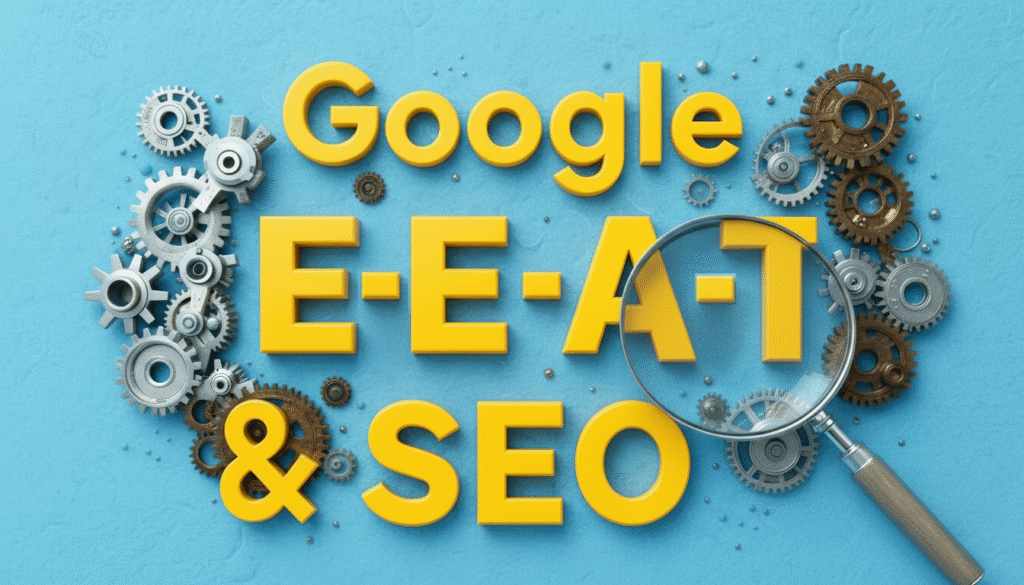Why Your Perfect Blog Post Isn’t Ranking
Imagine this: you’ve spent hours writing the perfect blog post, carefully formatting it, sprinkling in just the right keywords, and proudly hitting “publish.” You lean back, sip your coffee, and wait for waves of traffic to roll in. Days pass… and nothing. Worse, you stumble across a much shorter, less detailed article sitting smugly in the top spot on Google.
Frustrating? You bet.
This is where Google’s E-E-A-T framework (Experience, Expertise, Authoritativeness, Trustworthiness) makes all the difference. It’s not just about writing long-form content or cramming keywords anymore—it’s about proving to Google that your site is credible, reliable, and created by real humans with real insights.
In this comprehensive guide, you’ll learn:
- What E-E-A-T really stands for (including the extra “E” Google added in 2022).
- Why E-E-A-T ≠ keywords, and why it matters more now than ever.
- Practical, step-by-step ways to improve your site’s E-E-A-T signals.
- How to future-proof your SEO strategy in an AI-driven search landscape.
Buckle up—by the end, you’ll not only understand E-E-A-T but also walk away with a clear roadmap to weave it into your content strategy without losing your personality (or your sanity).
What Does Google E-E-A-T Stand For?
At its core, E-E-A-T represents the qualities Google values most in content:
- Experience – Do you have first-hand involvement with the topic?
- Expertise – Do you (or the author) have professional knowledge or credentials?
- Authoritativeness – Are you recognized by others as a trusted voice in this field?
- Trustworthiness – Is your site safe, transparent, and reliable?
Sounds simple, right? But let’s dig deeper, because each word hides big implications for how Google ranks content.
What Does “Experience” Mean in E-E-A-T?
The first “E” was added in December 2022, and it changed the SEO game.
Experience is all about proving you’ve actually “been there, done that.” Google wants lived insights, not generic roundups.
- Example: A travel blogger who shares photos, stories, and tips from their road trip through Peru.
- Non-example: A faceless article titled “Top 10 Things to Do in Peru,” copied from TripAdvisor with no personal context.
The difference? Authenticity. Searchers crave real, relatable voices. So does Google.
What Does “Expertise” Mean in E-E-A-T?
Experience is powerful—but when the stakes are high, expertise is non-negotiable.
Google doesn’t want health advice from random hobby bloggers or financial tips from “crypto bros” with no track record. It wants professionally credible content:
- Health articles reviewed by licensed doctors.
- Finance blogs written (or fact-checked) by certified planners.
- SEO guides backed by real case studies and years of work.
If your content impacts a person’s well-being, money, or safety (YMYL topics), expertise must be visible and verifiable.
What Does “Authoritativeness” Mean in E-E-A-T?
Expertise is what you know. Authority is what others say about you.
- Do respected websites link back to your work?
- Are you mentioned or quoted in industry publications?
- Do peers or influencers recognize you as a thought leader?
Authority can’t be faked with quick hacks—it’s built through consistent credibility and reputation over time.
What Does “Trustworthiness” Mean in E-E-A-T?
Without trust, none of the other letters matter.
Trust is created by being transparent and safe:
- Hosting your site on secure HTTPS.
- Including visible author bios, contact information, and privacy policies.
- Showing your sources: citing studies, linking to research, clearly noting publication dates.
- Being honest about limitations or conflicts of interest.
Think of it this way: if you wouldn’t hand over your credit card details or follow medical advice from a site, why would Google rank it?
Why Is E-E-A-T Important for SEO?
Here’s the short version: Because SEO isn’t just about keywords anymore.
- Old SEO (2005): Stuff keywords, buy backlinks, ride the Google wave.
- Modern SEO (2024+): Combine technical optimization with credibility signals that prove you’re a trusted resource.
In fact, a 2024 SEMrush study found that websites with strong E-E-A-T signals were 30% more likely to rank in Google’s top 3 results than those without. That’s a serious advantage.
How Does E-E-A-T Affect Your Rankings?
E-E-A-T isn’t a traditional “ranking factor” like page speed. Instead, it’s baked into Google’s Search Quality Rater Guidelines—the massive manual used by human quality raters to evaluate search results.
While raters don’t directly change rankings, Google’s algorithms are fine-tuned to mirror their standards. Which means:
If your site lacks E-E-A-T, you risk:
- Being outranked by more credible competitors.
- Losing visibility for YMYL queries (finance, health, safety).
- Missing out on AI Overviews and Featured Snippets, which prize trust signals.
Think of E-E-A-T as SEO insurance against algorithm changes.
How to Improve E-E-A-T on Your Website (Step-by-Step Plan)
Ready to get practical? Let’s break down the exact steps you can take to strengthen your E-E-A-T signals.
1: Highlight Experience
- Add case studies, personal stories, or testimonials.
- Use screenshots, videos, or images of your actual process.
- Write in the first person (“Here’s what worked for me…”) to make your content human.
2: Showcase Expertise
- Display author bios with credentials prominently.
- Collaborate with professionals in sensitive niches (finance, health, legal).
- Add structured data (Person/Author schema) linking bios to LinkedIn profiles.
3: Build Authoritativeness
- Earn backlinks from respected industry sites.
- Contribute guest posts or podcasts in your field.
- Publish original research that others naturally want to reference.
4: Strengthen Trustworthiness
- Migrate to HTTPS if you haven’t already.
- Provide clear contact and About pages.
- Cite credible external sources (academic papers, industry reports).
- Maintain a visible editorial policy and review process.
5: Keep Content Updated
- Audit old posts for outdated info or broken links.
- Add “last updated” dates to articles.
- Correct mistakes openly—because yes, even Google respects honesty.
Comparison Table: What E-E-A-T Looks Like Across Niches
| Niche | Experience | Expertise | Authority | Trustworthiness |
|---|---|---|---|---|
| Health | Patient stories, workout case studies | MD-reviewed posts | Backlinks from journals | Citations, disclosures, credentials clearly shown |
| Finance | Real investment journeys, budgets | Licensed financial advisors | Mentions in financial sites | Secure site, disclaimers, privacy |
| Travel | Personal travel logs, photos | On-site travel planning experience | Links from tourism boards | Honest reviews, up-to-date guides |
| Tech/SEO | Case studies, screenshots | Industry certifications | Guest posts, SEO conferences | Transparent sourcing, updated methods |
Real-World Example of E-E-A-T in Action
Say you run a nutrition blog.
- Experience: You share your personal weight loss journey with food diaries and photos.
- Expertise: A registered dietitian reviews and fact-checks your articles.
- Authority: Your “Healthy Meal Prep” guide gets quoted in a fitness magazine.
- Trust: Every post cites research, authorship is clear, and your site uses HTTPS.
Result? Google rewards your blend of experience + professionalism with better rankings—because you’re not just adding noise, you’re adding real value and trust.
FAQs about Google E-E-A-T
1. Is E-E-A-T an official ranking factor?
Not directly. But many signals tied to E-E-A-T (backlinks, HTTPS, author info) influence rankings.
2. Does every website need E-E-A-T?
Yes, though the level of rigor depends on the niche. YMYL niches face higher scrutiny.
3. Can small bloggers compete with big sites?
Absolutely—by leaning into personal experience and niche depth. Big sites can’t replicate your unique lived stories.
4. How do backlinks tie into E-E-A-T?
High-quality backlinks help prove authority. Focus on mentions from trusted sites, not spammy link farms.
5. Can AI-written content meet E-E-A-T?
Yes, but only with human oversight, fact-checking, and added personal insights. Google penalizes generic, unverified AI fluff.
Final Thoughts: Building SEO That Lasts
Google’s algorithm updates can feel like riding a hoverboard on a bumpy road—thrilling one moment, terrifying the next. But E-E-A-T is your stability anchor.
- Show experience—don’t just tell.
- Prove expertise through credentials or partnerships.
- Earn authority from others in your industry.
- Build trustworthiness through honesty, transparency, and safety.
At the end of the day, ask yourself this:
“Would I trust this content if I didn’t know me?”
If the answer is yes, congratulations—you’re not just writing for algorithms. You’re building credibility that Google, readers, and future-proof SEO strategies all reward.

